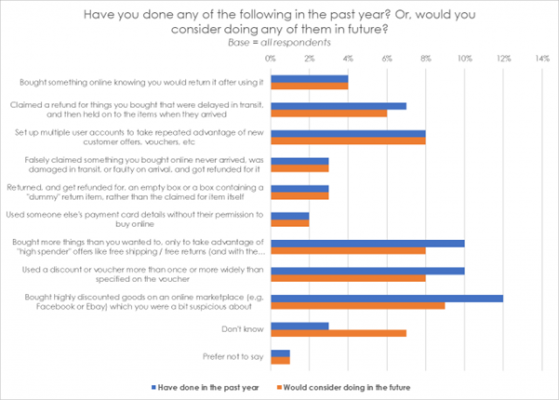High inflation, rising interest rates and a bleak near-term economic outlook have taken a toll on consumers the world over.
High corporate profits and subdued wage growth have also played their parts, contributing to a mood of uncertainty and feelings of financial vulnerability.
Is it so terribly surprising, then, that some digital consumers have turned to online fraud?
More than a third of shoppers commit fraud
New research commissioned by fraud prevention provider Ravelin has highlighted a startling statistic – more than a third of all internet shoppers (40%) have committed fraud within the last 12 months.
Ravelin polled more than 6,000 adults across the UK, France and Germany and found that vast numbers of consumers of all ages regularly commit fraud.
Those 45 and over have been revealed to be the worst offenders, who are apparently far more tech-savvy than stereotypes would have you believe.
41% of respondents who committed fraud in the last year were from the over-45 age group, compared to 17% of 18-24 year-olds, 23% of 25-34 year-olds and 20% of 35-44 year-olds.
Popular methods of fraudulent online shopping include gaming policies by taking advantage of promotions, returns or refunds to get more than they paid for, grey imports, or using someone else's card details without permission.
How are consumers committing fraud?
Some of the more interesting methods include:
- Item not received fraud: Falsely claiming ordered goods never arrived. The customer might then request a refund or a new item to be shipped and then could resell the extra goods or keep them.
- Faulty or damaged item: A customer can put through a chargeback request with their bank or a refund request with the merchant, misrepresenting the condition or state of the items upon arrival. They then request a new item and keep or sell the old one, which in fact was in good working order.
- Wardrobing/free-renting: Buying an item with the intention of returning it after using it once or twice – for example, returning a new dress after wearing it to a wedding.
- Fake returns: Attempting to return different – usually inferior – items to the ones purchased. The merchant will often approve the refund before verifying the parcel's contents.
Methods and motivations vary, but overall shoppers appear unrepentant – over a third (37%) of people who have committed fraud in the last year believe their monetary benefit outweighs the company’s monetary loss.
US$48 billion in losses
While consumers are unconcerned by the impacts of fraud, companies have been taken by surprise by the scale of the problem.
Juniper Research estimates that e-commerce payment fraud losses will exceed US$48 billion by the end of 2023 – accelerated by increasing use of alternative payment methods, such as digital wallets and BNPL (Buy-Now-Pay-Later), which are creating new fraud risks.
“Merchants are aware they have a problem with their own customers committing fraud, but the scale to which this is happening has not been clear until now,” Ravelin CEO Martin Sweeney said.
“We live in difficult times, so it is perhaps not surprising that some consumers find themselves tempted into fraudulent behaviour, but the fact so many otherwise respectable middle-aged people are involved seems quite significant.
“Merchants must be more vigilant and alert to all sources of fraud. And the best way to achieve this is to have a deeper data-led understanding of your business powered by automation.
“Retailers and e-commerce merchants need to balance the need to clamp down on fraud with offering customers an easy and safe shopping experience.
“The right automation can help merchants strike the right balance for their business.”
Triggers for said fraud include cost-of-living pressures, the effects of the COVID-19 pandemic, unemployment and financial pressures from children on starting school or university.
Interestingly, it seems once the line has been crossed, it’s difficult to go back.
More than a third (39%) of respondents admitted they commit fraud as often, if not more, than previous years.
A majority also said it was easy to get away with, suggesting companies are unaware of or unable to respond to widespread consumer-based fraud.
With e-commerce sales growing at pace – 21.2% of all retail sales are predicted to be online purchases from 2025 – retailers will need to find novel and effective ways to stymie this new wave of mum and pop fraudsters.
Read more on Proactive Investors AU
